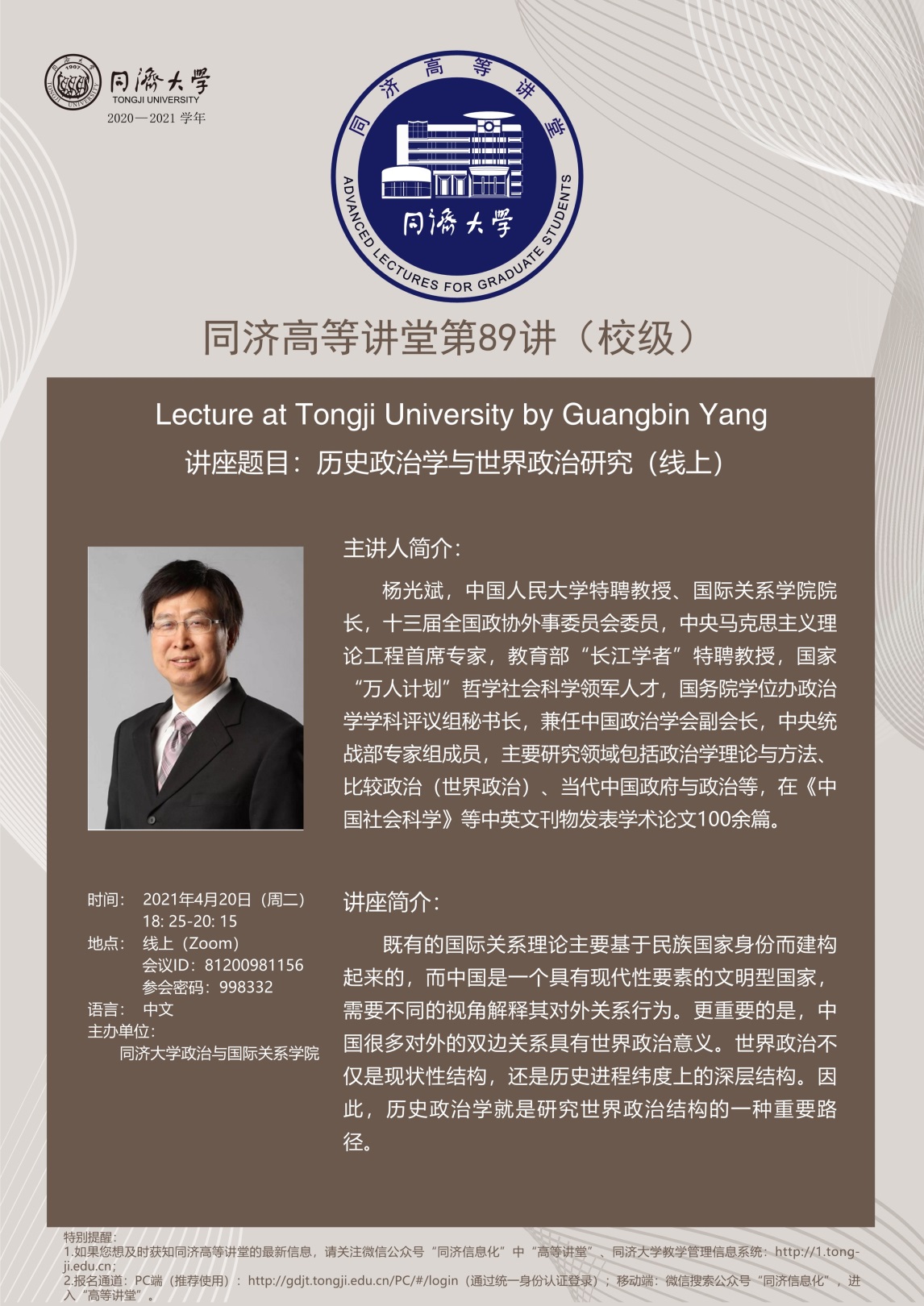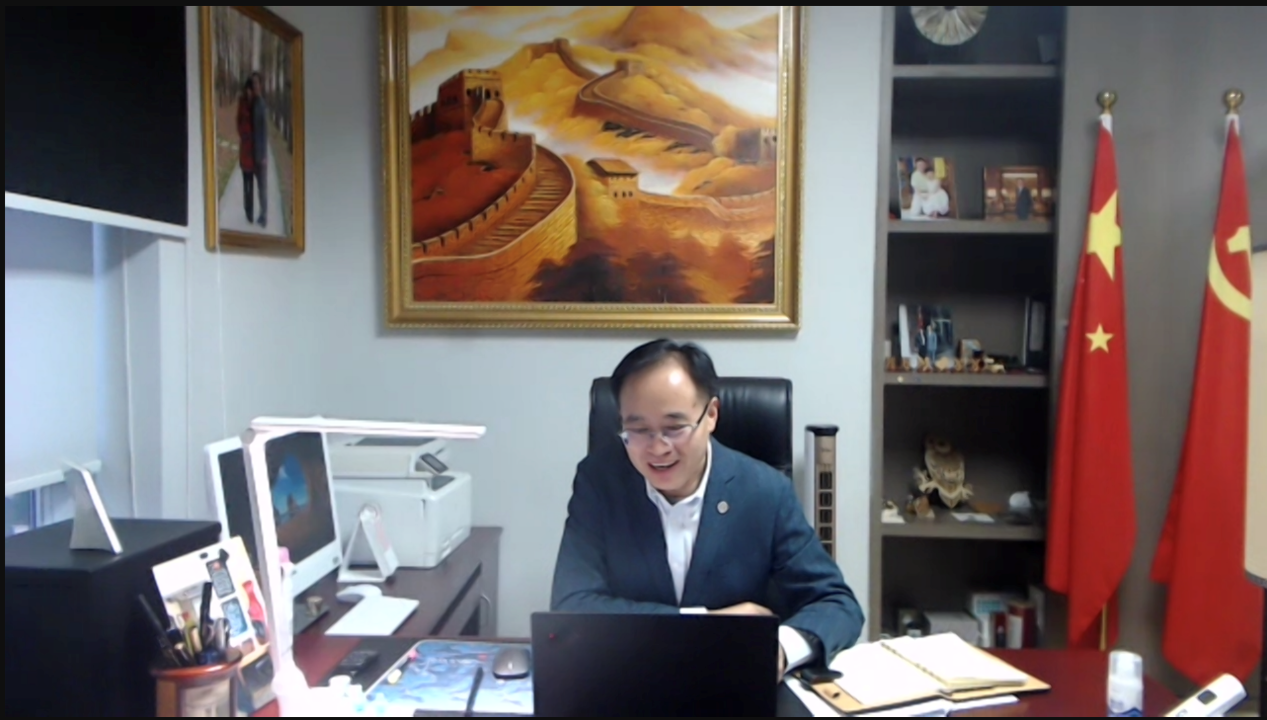News




The 89th lecture of “Tongji Advanced Lectures for Graduate Students” was successfully held by the Institute for China & World Studies and the School of Political Science & International Relations, Tongji University on the evening of April 20, 2021 via Zoom. Professor Yang Guangbin from the School of International Studies, Renmin University of China was specially invited to deliver a keynote speech themed “Historical Political Science and World Politics Studies”. Professor Men Honghua, President of the Institute for China & World Studies and Dean of the School of Political Science & International Relations, Tongji University, moderated the lecture. Professor Song Wei, Director of the Department of International Politics, the School of International Studies, Renmin University of China, attended the lecture as a guest. Nearly 300 teachers and students from inside and outside Tongji University watched the academic lecture online.
Professor Yang is a distinguished professor and Dean of the School of International Relations of Renmin University of China, a member of the Foreign Affairs Committee of the 13th CPPCC National Committee, a chief expert in the Central Marxist Theory Research and Construction Project, a distinguished professor under the Changjiang Scholar Program of MOE, and a leading talent in Philosophy and Social Sciences of the National “Ten Thousand Talents Program”. His research interests include theory and methodology of political science, comparative politics (world politics), contemporary Chinese government and politics, China’s domestic political economy and foreign relations. Professor Yang has written seven academic monographs, and published three research-based textbooks and nearly 100 academic papers in Chinese and English. Many of his research findings have produced significant theoretical and practical influence.
In this lecture, Professor Yang explained his opinions from “political ideological trend and changes in world politics”, “political ideological trend and the driving force of changes in world politics”, “political ideological trend and world order: thought and academic research”, “the end of ‘End of History’ and the rise of identity politics”, and “the rise of China and the outlook on the new world order”.
Firstly, Professor Yang took the crisis of political ideological trend faced by China, the United States and the Soviet Union during the Cold War as an example to introduce the importance of political ideological trend from the perspective of the principle of state power. He held the opinion that state power is a combination of ideological power, economic power, military power and political power, and all of them are indispensable. As further stressed by him, ideology represents the fundamental value of the founding of a country; it is a kind of important power; it not only forms part of the superstructure, but also acts as the foundation of the foundation. He pointed out that the leaders of the Soviet Union had made strategic mistakes and ignored the connection between ideology and social change in the use and acquisition of state power, which led to the disintegration of the Soviet Union. By contrast, after the Cultural Revolution, China adopted the policy of 'sticking to the direction and mixing first' and continued to implement democratic centralism. Based on the implementation of the Four Cardinal Principles of adhering to the socialist road, the people's democratic dictatorship, the leadership of the CPC, and Marxism-Leninism and Mao Zedong Thought” and the market-oriented economy of mixed ownership with public ownership as the mainstay, China achieved national stability and development.

Secondly, Professor Yang expounded the dynamic role of political ideological trend in the changes in world politics. He identified technology, capital (trade and war) and political ideological trend as the three forces driving changes in world politics. With regard to the role of technology and capital from the perspective of Professor Yang, technology, as a neutral force, has actively promoted political change in the world, while capital has demonstrated its great power and role in Britain's 100-year history of colonization and war, namely, the power and role of not only leading to changes in social class, but also triggering changes in social concepts and profit distribution mechanism. In the opinion of Professor Yang, trade and war do not necessarily shake the political pattern of a country, and the ultimate driving force for world political reform is the emergence and change of political ideological trend, especially the change in ideology of the original elite class. He summed up the three main mechanisms of political ideological trend: the domestic needs give birth to political ideological trend; the central state or the international organization dominated by the central state disseminates political ideological trend; and the political ideological trend induces institutional change.
Thirdly, Professor Yang discussed the world order effect of political ideological trend from the perspective of thought and academic research. In his opinion, the research object of world politics is the institutional and order effects of political ideological trend, namely, the domestic institutional changes induced by political ideological trend, and the relations between great powers and the world order thus shaped. Therefore, the development of world politics will also promote the transformation and upgrading of international relations research. In terms of the research path of world politics, Professor Yang believed that historical research is always the main path, and although historical political science seems to be an old concept, it can play a new role and effect in identifying major practical problems, clarifying the historical origin of theoretical problems, and revealing the temporal causal mechanism. In the research of specific issues, Professor Yang applies the approach of historical political science to the analysis of the relationship between expansionary ideology, rebellious ideology and world order. The development of bourgeois liberalism shows that capitalist countries such as Britain and the US colonized and expanded in the world based on the political ideology of liberal imperialism, such as Alexis de Tocqueville's theory of ethnic superiority, Max Weber's theory of cultural and institutional superiority, and Francis Fukuyama's “end of history” thesis; while the rise in nationalism, national self-determination movement, and world socialist movement will constantly promote the reorganization of the world order.
Then, Professor Yang explained the end of “end of history” and the rise of identity politics from the perspective of the dilemma of liberal democracy. He believes that the political logic of the dilemma of liberal democracy lies in that the competitive election within bourgeois liberalism results in political parties’ struggle for power, and the differences in social basis among different political parties further aggravate conflict among parties and political division, which then gives birth to identity politics and ultimately leads to tribalism politics. Professor Yang pointed out that from a global perspective, the globalization did not bring about universality, but intensified the tribalism of global politics. As for the reasons, he argued that globalization has intensified economic inequality which propels capitalist countries who once believed in liberal democracy to turn to domestic politics, and their need for domestic votes has stimulated the localization thought.
Finally, Professor Yang discussed the impact of China’s rise on the world order. As emphasized by him, China is a community of civilization genes, centering on the people-first principle, and cherishing a national view of Great Unity. He further pointed out that the status of civilization is based on the economy, therefore, the changes in industrial GDP in Western and non-Western countries have led to the emergence of profound changes unseen in a century, triggering the shift of world center from the West to the East. Although this shift is a prolonged and slow journey, it will bring historic opportunities to China and other Eastern countries.

After the keynote speech, Professor Men Honghua commented that Professor Yang explained the dilemma of liberal democracy and the development logic of world politics with a focus on the function and effect of political ideological trend from a big historical perspective, demonstrating to everyone that 'the ever-changing nature of the affairs of human life originates from the change of ideas', and that every change of thought brings competition, conflict and development while promoting human progress. In the opinion of Professor Men, integrating thoughts into the interpretation of science and feeling the power of history are necessary for understanding not only the evolution of world history, but also the evolution of contemporary society; the future trend of discipline development will feature the transformation from comparative politics and international politics studies to world politics studies and the transformation of international relations from the Western perspective to the Chinese and Western perspectives. On behalf of the school, Professor Men expressed his gratitude to Professor Yang for the wonderful lecture he brought to Tongji teachers and students, and his longing for Professor Yang’s field visit to Tongji.